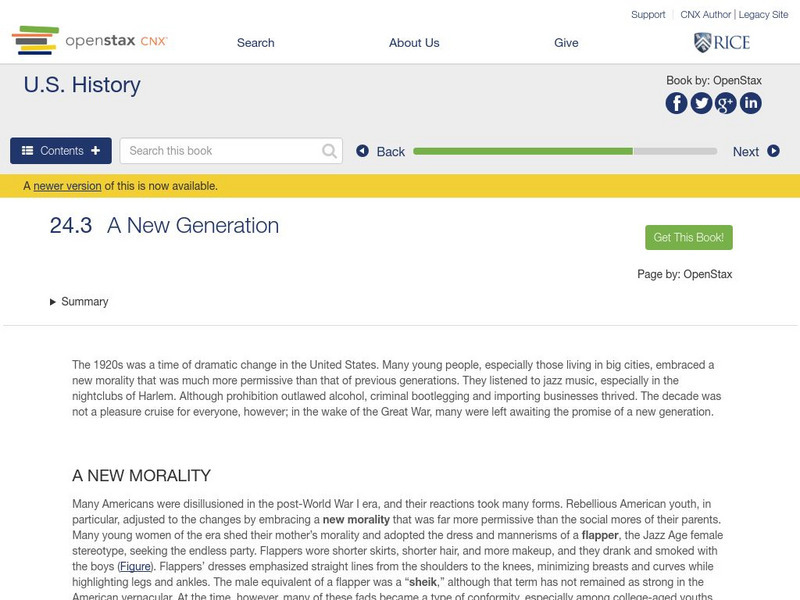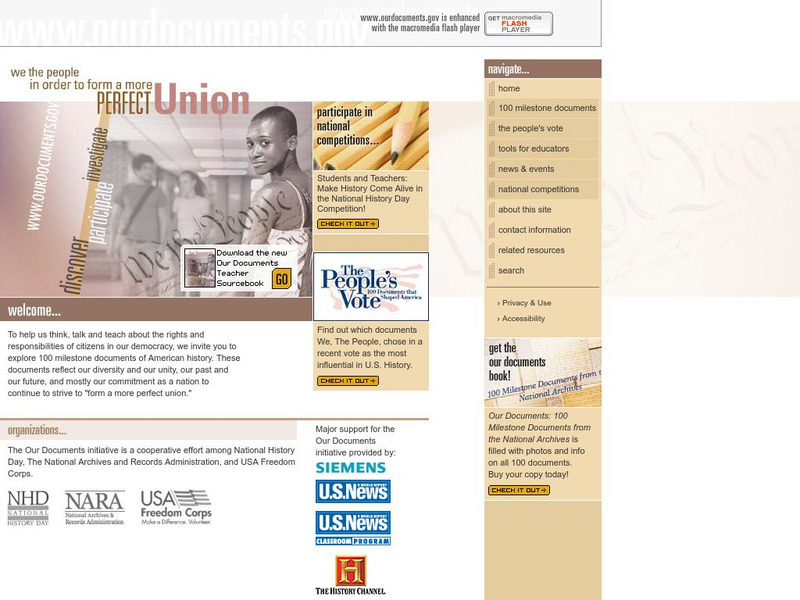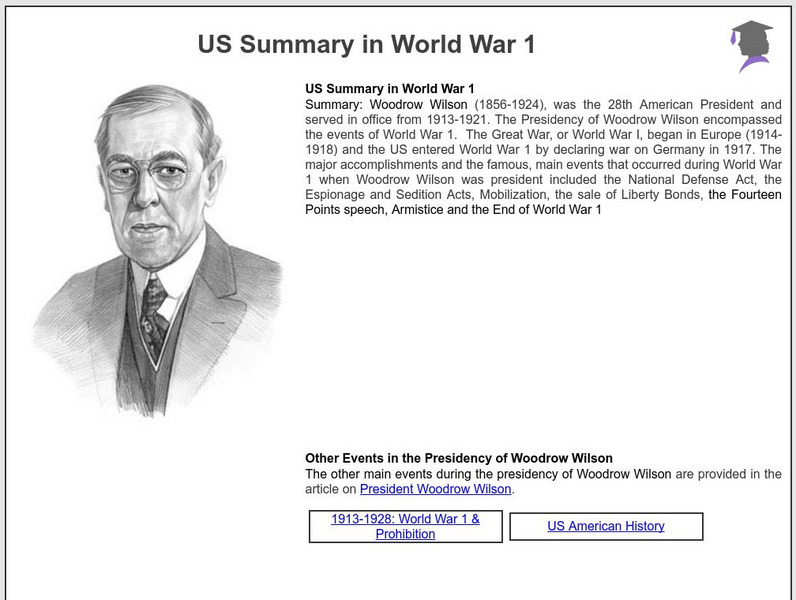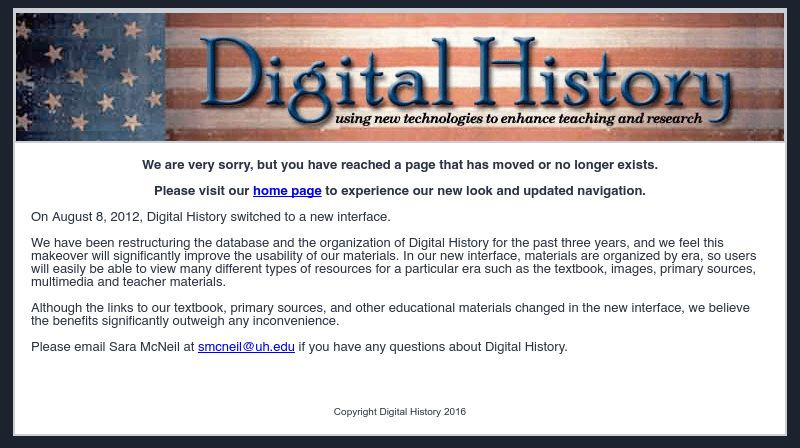US National Archives
National Archives: Prohibition and Its Consequences
Was prohibition necessary to protect family values or was it an over-reach by the government? Students will debate this question while analyzing documents from this era. Documents include political cartoon, photos, letters from citizens,...
Thomson Reuters
Find Law: u.s. Constitution: Eighteenth Amendment
The 18th amendment regarding the prohibition of intoxicating liquors, as it is worded in the U.S. Constitution. Annotations about the validity, enforcement, and repeal of the amendment are provided, as well as footnotes.
Siteseen
Siteseen: American Historama: Volstead Act
Comprehensive summary provides facts and information that relates how the Volstead Act, or National Prohibition Act, was enacted to enforce the 18th amendment on Prohibition.
Library of Congress
Loc: Today in History: October 28: Gilbert H. Grosvenor & Volstead Act
Find a treasure trove of links in the Library of Congress to music, speeches, photographs, and other information about Gilbert H. Grosvenor, the editor of National Geographic Magazine, and about temperance, prohibition, and the eventual...
Ohio History Central
Ohio History Central: Volstead Act
A brief description of the Volstead Act, which allowed the federal government to enforce the 18th Amendment prohibiting the manufacture, sale, or distribution of intoxicating liquors, better know as Prohibition.
US National Archives
Nara: Teaching With Documents: Civil Rights Act of 1964 and the Eeoc
The Civil Rights Act of 1964 prohibited not only discrimination based on race, but also gender. Use this lesson plan to explore the document, particularly Title VII in examining the law.
OpenStax
Open Stax: The Jazz Age: Redefining the Nation 1919 1929: A New Generation
Looks at the new morality that emerged in the 1920s. It changed the role of women and the perception of African Americans, the latter facilitated by the Harlem Renaissance and its impact on the music and dance of the Jazz Age. Also...
Other
The Unconstitutionality of the Laws of Congress Prohibiting Private Mails
An exposition by Lysander Spooner on behalf of the American Letter Mail Company entered according to an Act of Congress in1844, asserting that the company should have the right to establish post offices in competition with those of...
US Department of Justice
U.s. Department of Justice: Omnibus Crime Control and Safe Streets Act of 1968
A complete government description of Section 3789d of the Omnibus Crime Control and Safe Streets Act of 1968, which explicitly prohibits the federal government from controlling state or local police agencies, and which explicitly...
Digital History
Digital History: The Roaring Twenties [Pdf]
Read this comprehensive look at the Roaring Twenties, or Jazz Age. Read about Prohibition and its ramifications, women's gains, entertainment, and literature. Also find out about the resurgence of racial unrest and violence. A very good...
Other
Anti Saloon League Museum
From 1893 to 1933, the Anti-Saloon League was a major force in American politics. Influencing the United States through the printed word and lobbying, it turned a moral crusade into a Constitutional amendment. The League left a legacy of...
Siteseen
Siteseen: American Historama: Immigration Act of 1924
A comprehensive summary with interesting facts about the Immigration Act of 1924 that used national origin quotas as a permanent basis for U.S. immigration policy.
US National Archives
Our Documents: A National Initiative on American History, Civics, and Service
Our Documents is home to one hundred milestone documents that influenced that course of American history and American democracy. Includes full-page scans of each document, transcriptions, background information on their significance, and...
Curated OER
Wikipedia: National Historic Landmarks in Minnesota: Andrew John Volstead House
From 1894 to 1930, this was the home of Andrew J. Volstead (1860-1947), the man who "personified prohibition." Volstead served in the U.S. House of Representatives (1903-23), where he drafted the National Prohibition Enforcement Act...
Curated OER
Wikipedia: National Historic Landmarks in Alabama: Henry D. Clayton House
This was the home of anti-trust legislator Henry De Lamar Clayton, Jr. He was the author of the Clayton Antitrust Act, an act that prohibited particular types of conduct that were deemed to not be in the best interest of a competitive...
University of Notre Dame
University of Notre Dame: The Story of the Steel Seizure Case [Pdf]
Read about how President Roosevelt used his presidential powers to prohibit labor strikes during World War II. Scroll to page 4 of this PDF to read this background information which is part of a discussion about President Truman's...
Council for Economic Education
Econ Ed Link: The Choice Is Us: Monopolies
This instructional activity introduces the concept of monopoly. It calls upon learners to consider how monopoly power might affect the quality and price of goods and services offered to consumers. In light of what they learn about the...
Siteseen
Siteseen: American Historama: Us Summary in World War 1
Summaries of events and major accomplishments surrounding President Woodrow Wilson, the United States, and World War 1.
Library of Congress
Loc: Progressive Era to New Era, 1900 1929
This website defines and explores the Progressive Era and various aspects of American society during that period of history. It contains fairly simple text and several images.
US National Archives
Nara: Martha Griffiths and the Equal Rights Amendment
A good look at the way the Equal Rights Amendment moved through Congress. Find images of the discharge petition and joint resolution
Digital History
Digital History: Feminism Reborn
This comprehensive survey of the women's movement during the 1960s and 1970s documents women and politics, women's wages, legal discrimination against women, stereotypes of women, women's rights legislation, and women's rights...















